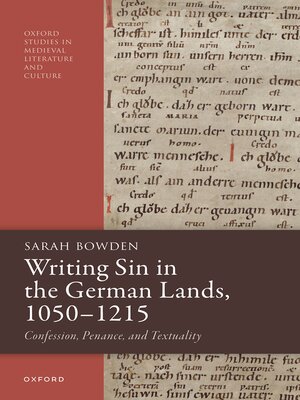Writing Sin in the German Lands, 1050–1215
ebook ∣ Confession, Penance, and Textuality · Oxford Studies in Medieval Literature and Culture
By Sarah Bowden

Sign up to save your library
With an OverDrive account, you can save your favorite libraries for at-a-glance information about availability. Find out more about OverDrive accounts.
Find this title in Libby, the library reading app by OverDrive.



Search for a digital library with this title
Title found at these libraries:
| Library Name | Distance |
|---|---|
| Loading... |
Writing Sin in the German Lands, 1050–1215 is about how sin and atonement function as an impetus for textual production and formal, linguistic, and intellectual creativity. It focuses on the late eleventh and twelfth centuries, a time in which various social and cultural conditions came together to provoke both an interest in sin and an opportunity for writing experimentally about it, and its area of enquiry is the German-speaking world. Working with a remarkably rich body of German-language texts, this book allows us not only to grasp with greater clarity aspects of medieval penitential thought and practice, but it also offers new ways of thinking about the development of German as a literary language. The book joins bodies of work on the history of penance and on devotional writing in the European vernaculars, and through the interconnection of these two fields of study, it offers a new perspective on questions that currently occupy scholars of the Middle Ages: the medieval conception of the self in relation to other and to God; the value and function of vernacular writing; the nature of textuality; and the relationship between writing, speech, material text, and performance. In five chapters that deal with a wide range of texts, many of which have had little scholarly attention, this volume shows that the long twelfth century was not only a period in which there was a particular interest in exploring aspects of the theology and practice of penance, but also, significantly, a time in which a fundamental connection can be seen between thinking about sin and creative literary production.







